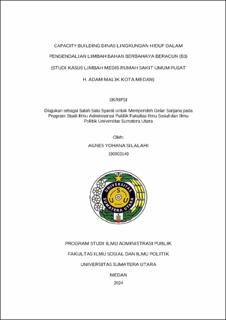| dc.description.abstract | The H. Adam Malik Medan City General Hospital produces hazardous and toxic waste (B3) in the form of medical waste and every year this increases, causing pollution problems that have an impact on human health and are detrimental to the environment affected by this waste. The aim of this research is to examine and analyze the Capacity Building of the Environmental Service in Controlling Toxic Hazardous Material Waste (B3) Case Study of Medical Waste at the H. Adam Malik Central General Hospital, Medan City.
The method used in this research is descriptive with a qualitative approach. Data collection was carried out using interview, observation and documentation techniques. The data obtained were analyzed qualitatively using the Capacity Building theory approach from Merilee S. Grindle which consists of Human Resource Development, Organizational Strengthening and Institutional Reform. In this research, to check the validity of the data, researchers focused more on comparing observational data with interview data.
The results of this research show that in the dimension of Human Resource Development carried out by the Medan City Environmental Service is good, where the control of Hazardous Waste (B3) produced by the Medan City General Hospital has been handled by providing Training and Technical Guidance to employees in charge of medical waste control and have implemented a recruitment system and salary system for officers in accordance with regulations and legislation. Likewise, the working conditions are quite comfortable for employees to carry out their duties. Furthermore, in the Organizational Strengthening dimension, it is still lacking because the Medan City Environmental Service still has problems in terms of personnel equipment and tools that function in controlling B3 waste in Medan City. Meanwhile, aspects of Leadership, Organizational Culture, Communication, Intensive Systems and managerial structures still do not play a direct role. Finally, the institutional reform dimension carried out by the Medan City Environmental Service is also still lacking because the policies and regulations made are monotonous so they cannot provide significant solutions in controlling hazardous waste. Likewise, the complicated bureaucracy makes it difficult to control the process of controlling B3 waste, but the economic and political aspects have an impact on developing the capacity of the Environmental Service in controlling B3 waste in Medan City. | en_US |


